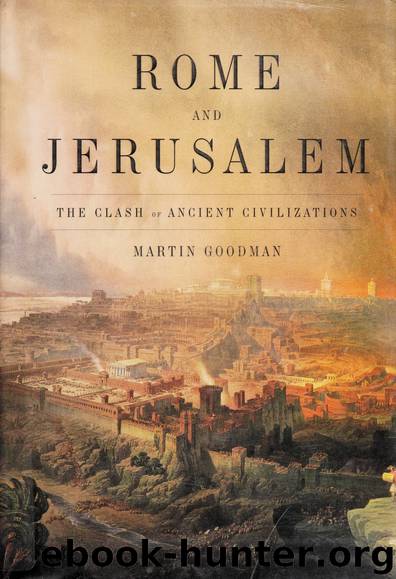Rome and Jerusalem : the clash of ancient civilizations by Goodman Martin 1953-

Author:Goodman, Martin, 1953-
Language: eng
Format: epub
Tags: Ancient Rome - History, History Of Judaism, History, History - General History, History: World, Ancient - General, Ancient - Rome, Jewish - Ancient, History / Ancient / General, 168 B.C.-135 A.D, Jews, Palestine, Politics and government, Rome, Judaism
ISBN: 0375726136
Publisher: New York : Alfred A. Knopf
Published: 2007-11-13T16:00:00+00:00
War
Both Romans and Jews made war frequently in the first century bce and the first century ce. Roman campaigns of imperial expansion were to continue at irregular intervals throughout the early empire, whenever an emperor felt the need of a great military achievement to consolidate his image, notably Claudius in Britain in 43 ce, Domitian in the 80s and Trajan in Dacia in the first decade of the second century and in northern Mesopotamia in the second decade. Even more frequent were wars to suppress rebellions within the frontiers. Jews fought wars of conquest under the late Hasmonaeans, and, as we have seen, an extended war of liberation in 66—70. Jews also served as mercenaries for the Ptolemies in the second and first centuries bce, and both Babylonian and Idumaean Jews were professional soldiers in the pay of Herod. For both Jews and Romans, war was an inevitable part of life.
Every spring the priests of the Roman state threw open the gates of the temple of Janus to indicate the beginning of the campaigning season. The temple gates were usually shut again only when the onset of winter brought fighting to a standstill. In 28 bce, and on two later occasions, Augustus ceremonially shut the gates in the middle of the year to symbolize the completion of a current campaign, but this signified only a temporary hiatus in what was, in essence, a permanent state of war. Indeed, the political system of Rome categorized the citizenry by their military potential, with rich cavalrymen (equites) at the top, the poorer (who were less able to arm themselves well) nearer the bottom, and women and children, who were excluded from fighting, also excluded from all formal influence over policy. From the beginning of Augustus’ rule, after his victory over Mark
Antony at Actium, in practice the Roman army was as professional and permanent as that of the Ptolemies had been, but the ideology of Rome as a state dependent on its armed citizenry persisted in the history books of Augustus’ contemporary Livy, and in Roman images of their ideal society.
Despite this underlying militarism, Romans in the Republic valued the implausible notion that all the wars they fought were defensive. Only thus was divine approval guaranteed. It may seem surprising that any Roman in the first century bce could believe, or even half-believe, that they had conquered the entire Mediterranean world in defence of their city in central Italy, but the illusion that they fought only in defence was achieved by a formality which, although it might appear now a mere pretext, Romans seem to have taken very seriously. Religious law required the enemy to have unreasonably rejected Roman demands if the ensuing conflict was to be denoted just, as Cicero records: “As for war, equitable rules touching it are drawn up in the . . . law of the Roman people in the most sacred fashion; and from this it may be gathered that no war is just, unless it is entered upon
Download
This site does not store any files on its server. We only index and link to content provided by other sites. Please contact the content providers to delete copyright contents if any and email us, we'll remove relevant links or contents immediately.
| Africa | Americas |
| Arctic & Antarctica | Asia |
| Australia & Oceania | Europe |
| Middle East | Russia |
| United States | World |
| Ancient Civilizations | Military |
| Historical Study & Educational Resources |
The Mysteries of Mithra by Cumont Franz(1353)
The Fall of Carthage by Adrian Goldsworthy(1318)
Sacred Britannia: The Gods and Rituals of Roman Britain by Aldhouse-Green Miranda(1153)
Letters from a Stoic (Classics) by Seneca(1038)
Selected Political Speeches by Marcus Tullius Cicero(987)
The Ghosts of Cannae: Hannibal and the Darkest Hour of the Roman Republic by Robert L. O'Connell(983)
The Satyricon by Petronius(980)
Fall of the Roman Republic (Penguin Classics) by Plutarch(973)
The Poison King: The Life and Legend of Mithradates, Rome's Deadliest Enemy by Adrienne Mayor(962)
Rome's Gothic Wars: From the Third Century to Alaric by Michael Kulikowski(948)
Rubicon: The Triumph and Tragedy of the Roman Republic by Tom Holland(945)
Hadrian and the Triumph of Rome by Everitt Anthony(894)
In Defence of the Republic by Cicero(874)
The Roman History by Cassius Dio(872)
Delphi Complete Works of Cicero by Cicero(826)
Letters from a Stoic by Seneca(817)
The Spartacus War by Strauss Barry(801)
Marcus Aurelius by John Sellars(796)
The Twelve Caesars (Penguin Classics) by Suetonius & Robert Graves(777)
